How to Qualify for Section 8 Housing In Texas? [2 Simple Steps]
I would like you to understand what a great chance this is for you to access affordable housing and live in comfortable conditions and urban development with government support.
So, How to Qualify for Section 8 Housing In Texas? Don’t think it’s very easy. Every seemingly simple question may have subtleties and pitfalls. That’s why I’m here to guide you through eligibility criteria, income thresholds, and the application process, which for some can be like navigating a maze.
But this is for those who do not know the secrets, and you will learn them. Do you feel the difference?
I’ll share some valuable resources and helpful tips to assist you in navigating the maze of low-income housing options in Texas. And these are not just boastful words, because I have extensive experience in housing advocacy and community outreach.
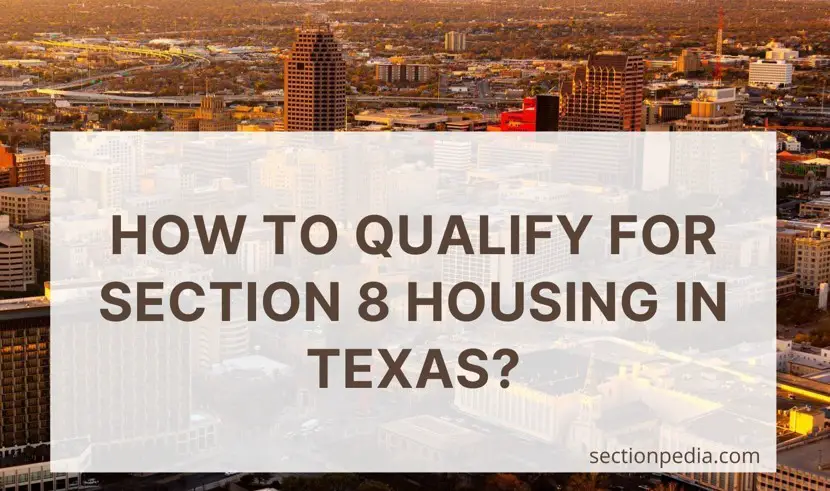
How to Qualify for Section 8 Housing In Texas?
I don’t think it’s worth explaining that not everyone can qualify for Section 8 housing in Texas. So, how does Section 8 work in Texas? To qualify for Section 8 Housing In Texas, you must meet certain income criteria.
These criteria for rental assistance are determined based on the median income in Texas and your family size. I’ll provide information about income limits and family size next, so keep reading.
Eligibility for the Texas Housing Section 8 program also depends on the following factors:
- Credit history
- Immigration status
- Identity and citizenship status
- Criminal record
- Background checks
When it comes to your credit history, there are two main things that landlords and public housing agencies look for.
- First, they want to know if you have a record of paying your bills on time, it is great if you have good rental history.
- Second, they want to know how much debt you owe.
If you pay your bills late or have a lot of outstanding debt, landlords may be concerned that you won’t be able to make rent payments each month.
Family Status. At least one member of your family must be a U.S. citizen or legal resident. If you are under age 18, you must have a parent or guardian who is eligible for the program.
If you are over 18 and not disabled, you may only qualify for this program if you have a dependent child living with you in the home.
The child does not need to be related to you biologically or legally; he or she merely needs to be a dependent such as a foster child that lives with you full-time and relies on your financial support.
If you are over 18 and disabled, you can qualify if this disability prevents you from working and earning a living.
Immigration Status. If you aren’t a U.S. citizen but have been granted legal immigration status, that status typically won’t affect your eligibility for Section 8 housing assistance.
However, if you are in the U.S. illegally or on an expired visa, it is unlikely that you will qualify for this program’s benefits.
Identity and Citizenship Status. To qualify for Section 8 housing in Texas, you must be able to prove your identity and legal citizenship status.
These requirements will vary slightly by jurisdiction, but generally speaking, you’ll need to provide a U.S. passport or birth certificate as proof of citizenship.
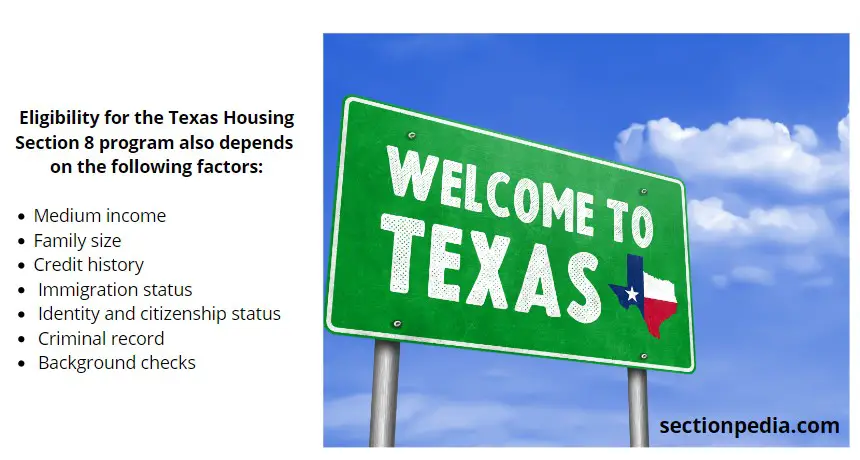
In addition, you should bring a photo ID card such as a driver’s license or state-issued identification card.
What I also want to draw attention to is your criminal record.
If you have been convicted of fraud (or if any member of the household has) in connection with any federal housing assistance program, you will not be eligible for assistance under the Section 8 Housing Choice Voucher Program.
If you are ineligible due to a fraud conviction, your ineligibility period will last for a minimum of five years from the date that the conviction occurred.
It is also possible that you may be permanently ineligible in certain circumstances (i.e., if the fraud resulted in substantial loss to the government).
Background Checks. If you meet all of the above eligibility requirements and you’re currently in search of housing through Section 8, you’ll need to pass a background check before being approved for assistance.
Generally speaking, Section 8 will consider any prior drug-related crimes, violent crimes, or sex crimes when approving an applicant for Section 8 housing assistance (or denying an applicant).
If you have a prior conviction on your record, you’ll need to explain why the incident occurred and what steps you’ve taken toward rehabilitation.
Read also: Luxury Apartments That Accept Section 8 Vouchers
What are the Income Limits for Section 8 Housing in Texas?
As I mentioned earlier, the income limits for Section 8 in Texas are determined based on the Area Median Income (AMI) and family size. AMI varies from region to region, so it’s important if you plan to live in Texas, to refer to Texas rates rather than, for example, New York or Arizona rates.
For your convenience, I’m providing up-to-date information on the state median income limits in Texas.
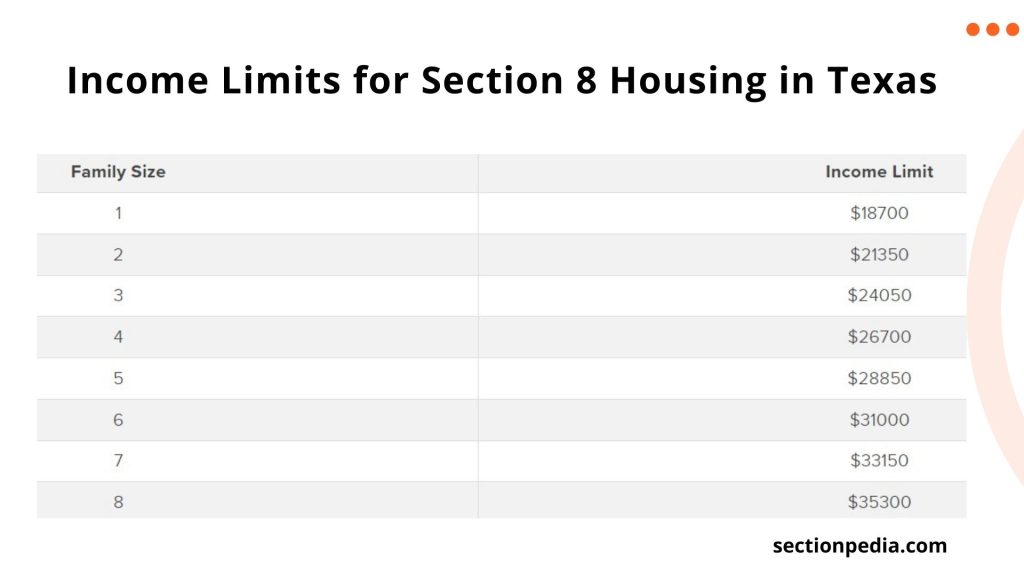
Please note that income limits may change over time, so it’s essential to check with your Texas Housing Authorities or HUD for the most current information on Section 8 income limits, Texas.
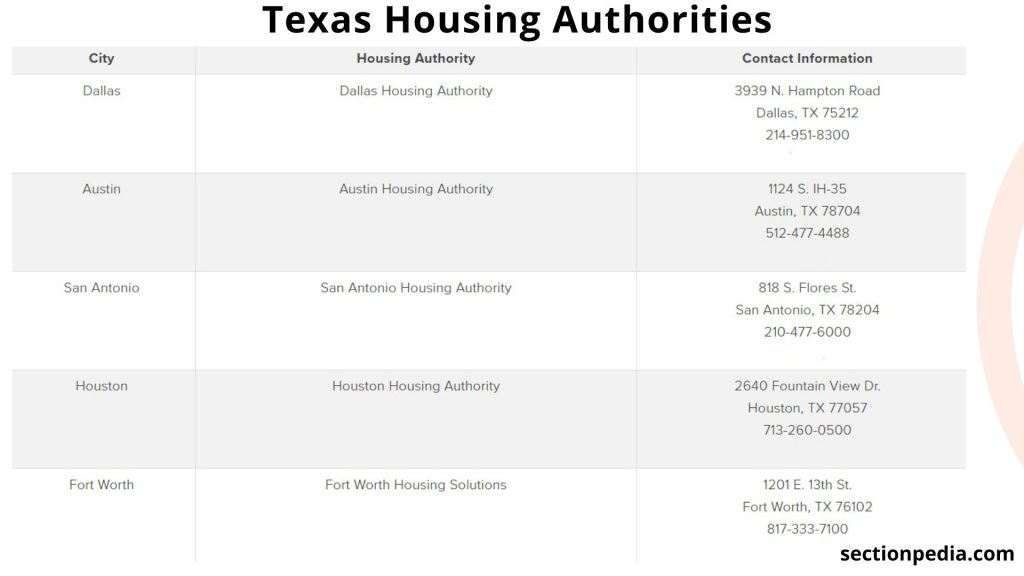
Additionally, I hope you might understand that even if you meet the specified income criteria, you may not immediately secure affordable housing, as each state maintains its long waiting lists.
Fair Market Rents for Section 8 Housing in Texas
Now, let me explain what Fair Market Rent (FMR) is. This rate, determined by HUD, represents the typical amount for renting an apartment in a specific area. The FMR is updated annually.
Next, I’ll present a table of fair market rents for the major metropolitan areas in Texas.
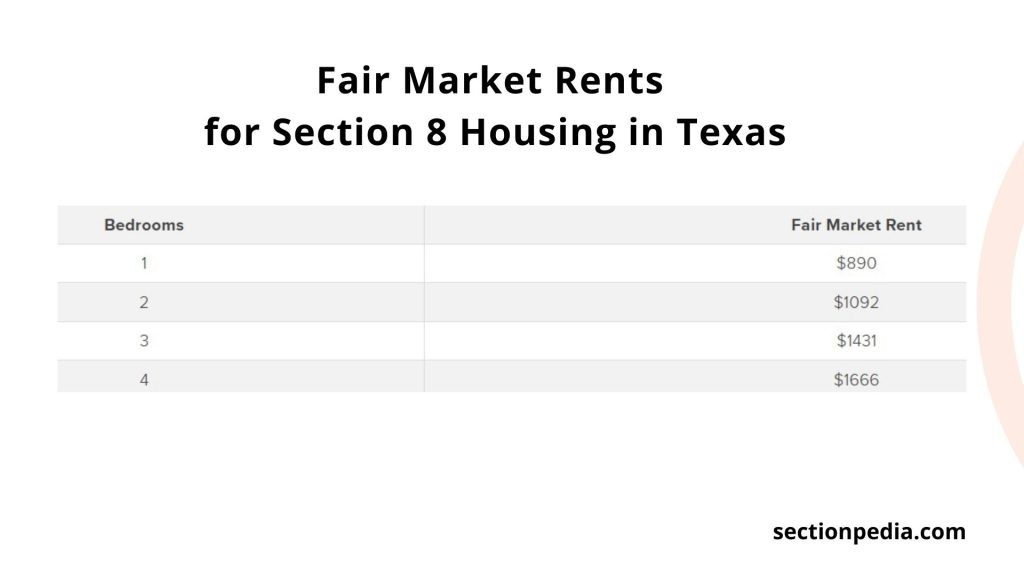
I’d also like to emphasize that as a tenant, you must clarify any amounts exceeding those listed in the table, as payments will only be made within these indicators.
How Do I Apply for Section 8 Housing in Texas?
Now, I will guide you step by step through the application process:
- Locate the housing authority (I have provided the addresses above in the table) or visit their website and review all the information to file Texas Section 8 application online.
- Complete the application form and submit all required documentation for rental assistance. These documents for department of housing may include proof of income, identification, and residency, as well as other information related to eligibility criteria such as citizenship, criminal history, and rental history.
If you choose to apply online (which is permissible and highly convenient in Texas), you can register on the online portal, fill out the form, and upload all necessary documents. Verify that everything has been added correctly, and then simply wait for a response.
FAQs
What is the Maximum Amount of Rent That Section 8 Will Pay in Texas?
Section 8 rent in Texas is determined by factors such as fair market rent (FMR), apartment size, and tenant income. My observation is that renters typically pay 30% of their adjusted monthly income. However, my point is that specific maximum rent amounts vary depending on location and type of housing unit.
Who administers the Housing Choice Voucher program in Texas?
The housing choice voucher program in Texas is administered by the Public Housing Authorities.
Are there housing choice vouchers specifically for persons with disabilities in Texas?
Yes, this is where I can make you happy, because in Texas there actually are housing choice vouchers specifically designed for people with disabilities.
Are there housing choice vouchers specifically for Texas veterans?
And here my answer is positive. But check with your local housing authority for all the details, as you will need to add some documents.
Conclusion
In conclusion, navigating the process of qualifying for Section 8 housing in Texas requires a combination of careful research, preparation, and patience. Understanding the eligibility criteria, gathering necessary documentation, and submitting a thorough application are crucial steps in securing this vital form of assistance.
As we’ve explored, Section 8 provides a lifeline for individuals and families facing economic challenges, offering them the opportunity to access safe and affordable housing.
While the road to Section 8 approval may seem daunting, it’s essential to remember that the program exists to support those in need. By staying informed and proactive throughout the application process in Texas, low income families can increase their chances of qualifying for this valuable housing assistance.
Additionally, seeking guidance from public housing agencies, community organizations, and support services can provide invaluable assistance and make the journey more manageable.
In the end, Section 8 housing serves as a beacon of hope for those seeking stable and affordable living arrangements. By following the necessary steps, being diligent in the application process, and remaining resilient in the face of challenges, low income individuals and families can unlock the doors to safe, secure, and subsidized housing through the Section 8 program in Texas.


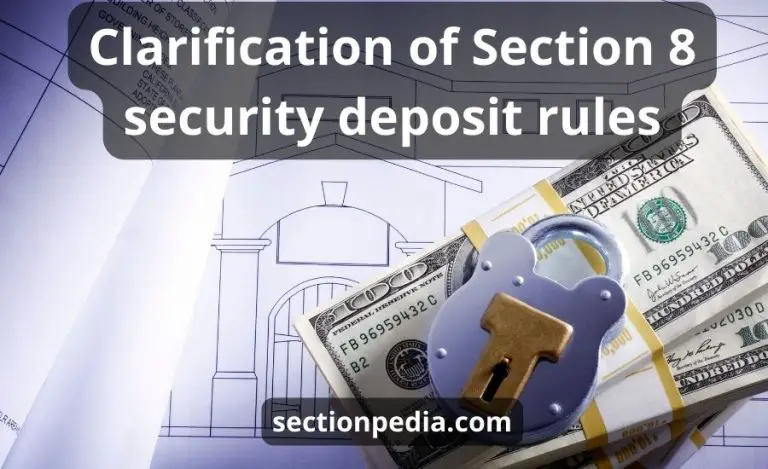
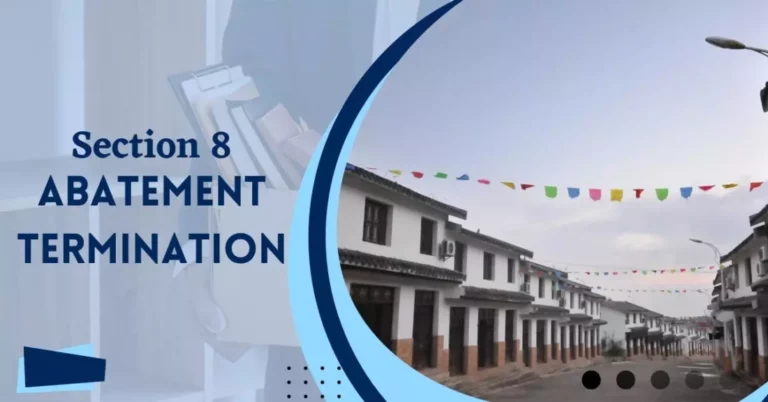

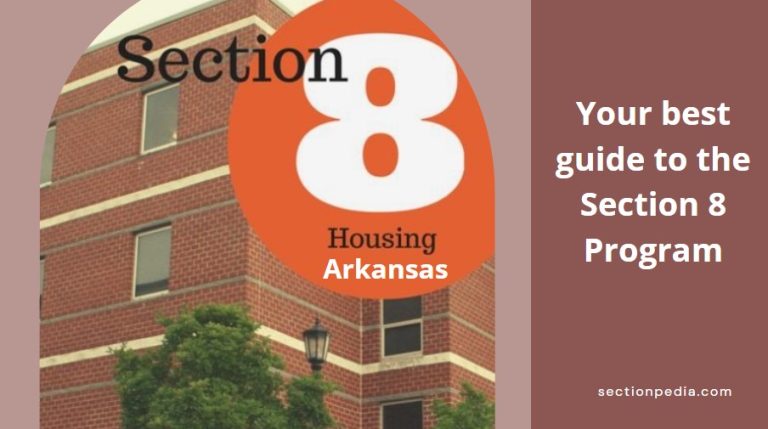


The solutions and policy recommendations in this article make it more than just informative; it’s a call to action for change
Thank you very much for sharing, I learned a lot from your article
I like the presentation of information, everything is simple and clear